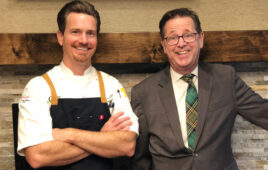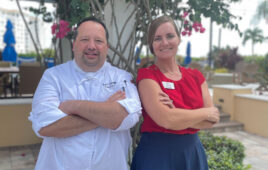Young culinarians can thrive in club kitchens when training and mentoring allows them to develop their skills and competencies.
Millennials—the generation born between 1980 and 1996—get a bad rap. They’re said to feel entitled and be narcissistic and addicted to social media. They job-hop. They lack engagement. They always ask why.
The thing is, millennials are now the largest generation in the workforce. So it’s critical for chefs and managers, regardless of age, to figure out how to cultivate the best potential from this group.

The Jonathan Club’s Jason McClain stress the importance of abundant and detailed communication.
Create an Experiential Environment
“Millennials require a different management approach,” says Matthew Allnatt, General Manager/COO of the Jonathan Club (Los Angeles, Calif.). “But they hold a lot of interesting potential. Everything is quick for them. They’re constantly plugged in. They thrive on personal relationships, feedback and purpose.”
Indeed, recent studies show that millennials are not really all that different from previous generations in what they want for their lives—they just have a different background.
“They crave and are motivated by experiences,” says Allnatt, who along with Executive Chef Jason McClain (see “Jonathan Club has a Passion for Quality,”), has created a series of programs at the club to better engage with these young leaders.
For example, each culinary team member takes a turn choosing a restaurant through Uber Eats—an online meal ordering and delivery platform. Together, the team will place an order and share a meal.
“We turn an ordinary lunch into a teambuilding experience,” says Allnatt. “We talk about the food and what elements or flavors we like. Then we brainstorm ways to incorporate those things into our menus.”
The Jonathan Club also offers two different intern programs for its millennials—one domestic and one international. For its domestic program, the club sends a young staff member to another city club within the country for a two-week internship. The club pays that person’s wages, travel and expenses. In return, the young staff member gets to see and experience something completely different.
Once a year, for its international program, the Jonathan Club sends a young F&B manager to Tokyo for a month. Interested applicants must first apply and make a presentation in front of the leadership team.
“When we sent our mixologist, Jen Len, to Japan, she came back more passionate about her career and our club than ever before,” says Allnatt. “She’ll never forget that the Jonathan Club sent her to Tokyo. And as long as she’s here with us, we will benefit from the ideas and research she gathered during that trip.”
Even when Len moves on, Allnatt is certain she’ll speak favorably of the club, because of the experiences she was fortunate to have while there.
“We invest in millennials as people,” says Allnatt, who encourages managers to train and mentor these individuals. “We have found that offering critical feedback in a productive way, as well as giving straightforward and detailed instruction, is especially useful.”
Because millennials grew up with Google, Youtube, and Yelp and had an instructional video for nearly everything, McClain offers that same sort of guidance with a carefully crafted library of YouTube and Netflix videos that can help them learn new culinary skills.
“[Millennials’] phones are never more than an arm’s-length away,” notes Allnatt. “You can’t give them this much freedom without a foundation of managers who understand how to rein them in and bring out their potential.”
Millennial Manager
Charles Gardiner, CEC, Executive Chef of The Club at Longview (Weddington, N.C.), has a unique perspective—he is a millennial managing millennials.

The Club at Longview’s Charles Gardiner (left in front row of photo at right) empowers and connects with other millennials by sharing his personal experience.
Gardiner came to the club almost a year ago, after working at the Chevy Chase (Md.) Club under Scott Craig. This is his first role as Executive Chef.
“There’s a fine line between being their peer and their boss,” he says about those in his generation. “I try to empower and connect with them by sharing my personal experiences—but I also give them clear guidelines on what I expect.”
Recently, Gardiner sat down with his two demi chefs and his executive sous chef to come up with a series of culinary principals and core values, and a culinary vision statement. He then printed the statements on plastic cards that all team members can carry in their pocket.
“The cards act as a compass, pointing us all in the same direction,” says Gardiner.
To get the best out of the millennials on his team, he offers frequent, meaningful feedback, both formal and informal. And he isn’t afraid to get super-specific whenever he needs to.
“I know that I thrive on constant feedback,” says Gardiner. “So I try to give my cooks as much feedback as possible, positive and negative. We set goals and talk through how we can achieve them. When we reach them, we deconstruct and [analyze] why, so we can mirror that success in the future.”
Gardiner shares Allnatt’s sentiment that the only way for millennials to thrive is with managers who are willing to relate to them on a professional level.
“The first three months are the most critical,” says Gardiner. “I spend as much time as I can with them in the beginning offering answers to questions, building their confidence, and acknowledging their improvements. I also pair them with a tenured employee who can continue to build on the foundation I’ve established.”
Once they have their feet under them, the younger members of the Longview staff have grown exponentially, Gardiner reports. “The millennials on my team offer a different perspective and a youthful vigor that brings our food and our operation to life,” he says proudly.
The Best Way to Learn
J. Martin Lowry, CCC, Executive Chef of Twin Hills Golf and Country Club (Joplin, Mo.), spends a great deal of time teaching, training and coaching the millennials on his team. This gives him a competitive advantage over other restaurants and casinos in the area, while simultaneously developing loyal employees.

J. Martin Lowry (in whites), Executive Chef of Twin Hills G&CC,
emphasizes training and mentoring with the millenials on his team.
“Face-to-face communication is important,” says Lowry. “I personally teach my staff skills that will enhance their careers.
“We do more from scratch here at Twin Hills than most other operations in town,” he adds. ”So when a new hire walks into our kitchen believing he or she should be promoted to chef within a few months, we can gently give them perspective, by showing them how much there still is to learn.”
Lowry, who teaches everything from sausage- and cheese-making to management skills, has found that most millennials are more likely to get with the program when he explains why something has to be the way it is.
“Millennials are well-informed,” he says. “They set goals and are driven by a sense of purpose. When we invest in them, they are loyal to us. And when we have a strong team, we can continue delivering excellence to our members.”




